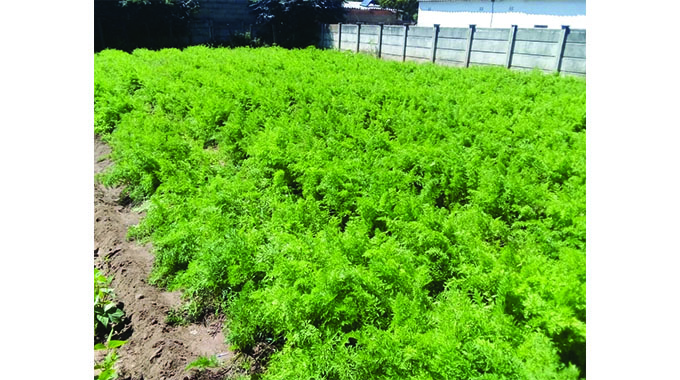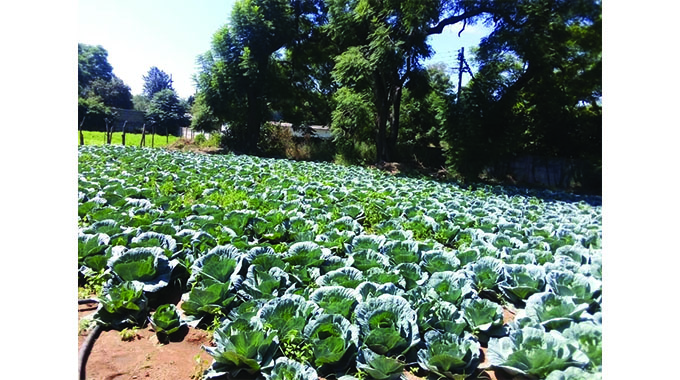
The Sunday News

Vincent Gono, Features Editor
MR Abiner Manyakaidze is a corporate sector retiree who started doing farming as a pastime passion on his plot in the leafy Hillside suburb. It was no sooner than later that he realised that his exploits were paying off in terms of family consumption and giving out to social connections – friends and relatives.
He no longer spent money buying tomatoes and vegetables. In fact, with that money, he said, he could buy himself a quart of beer or two as refreshment after working on his plot. Going commercial was far from him when he started.
But he could not resist those that were offering to buy his produce, at first a tomato crop that he had planted in his expansive yard behind his equally spacious house and later an amazing maize crop that is ready for harvest.
“I was equally surprised at the harvest. It was like magic,” he said with a chuckle.
And that was probably one of self-discovery journey as a farmer, which was a little far from the senior management positions that he used to hold in the corporate sector. He has no regrets whatsoever about the time he had spent in air-conditioned and teak furnished offices with his recent discovery that he was a round peg in a round hole as a farmer.

Mr Manyakaidze has since moved from his backyard plot to a more spacious one-hectare plot in the same Hillside suburb courtesy of a relative where he has proved that it is not the size of the land that one owns but the size of the brains to produce and manage that matters. He is naturally a man who quenches his desire for knowledge and skill in trying out new ventures usually out of interest and hinted that it requires patience.
“I started farming as a part-time passion. I just wanted to try out new things. It was out of interest to gain knowledge about farming and my first attempt was encouraging. It coincided with a bountiful rainy season and the produce was good,” he said.
He has now taken up his farming exploits further and has now grown cabbages, carrots and vegetables at the one-hectare plot where he is using boreholes for irrigation.
“I have no problems with water here. There are four boreholes and I am using just one. I am going to plant cauliflower, broccoli, peas and potatoes very soon as I expand my project,” he added.
With his passion, he now wants a bigger piece of land and he is not alone in the quest for ownership of space to do farming as a business. He however, feels there is a need for a paradigm shift in the minds of many that acquired land from priding themselves in mere ownership to taking farming as a business.
“We have got politicians who took land but they are not using it. They pride themselves in ownership but they are not using it productively and we are saying such land should be taken back to the State and be given to those that want to produce for the country,” he posited.
Alternatively, he said, the land should be given to agriculture graduates who can be advised to form co-operatives and do proper farming with capital support from the Government.
“In as much as we can not run away from the political narrative of the land question pre and post-independence, the focus should no longer be about politics of parties and entitlement but about who can produce for the nation,” said Mr Manyakaidze.
He said the freebies approach to life and reliance on donor supplies in institutions such as prisons and hospitals, most of which have land, was purely a management misfunction that requires condemnation. His sentiments were echoed by political analyst Mr Joel Mukusha who posited that Zimbabwe’s biggest post-independence achievement remains in the area of land reform. He said the identification of agriculture as one of the locomotive sectors for sustainable economic growth in the country’s economic blueprint the National Development Strategy 1 is apt.
“Land was the primary cause of the liberation struggle, in fact its seizure was the immediate cause, for from it (land), livelihoods were anchored and sustained. That historical narrative should never be forgotten,” he said.
The land question was the matchstick that lit the liberation bonfire although other factors such as forced labour and burdensome taxes were an oil-soaked rags that were waiting for the spark that the land issue provided.
The question of land therefore, features prominently in the shaping of the liberation struggle and in post-independent Zimbabwe, as the country is still smarting from its effects in the global political matrix. He said the country needed to take stock and see if the prime land was not being wasted under the guise of ownership.
Mr Mukusha submitted that the historical narrative of the country’s development could therefore be traced not only to the availability of land but most importantly its usage to develop the country’s economy.
“It is the ability to work on it that inspired the ideology of nationalist fathers such as Mwalimu Julius Kambarage Nyerere who were not slow to take it up, sanctify it and develop it into a pragmatic discourse (the villagisation concept) that sought to wean Africa off the dependence on imperialists,” he said.
He added that Zimbabweans should stop unnecessary politicking among themselves about the land question as there should be agreement that the land reform was justified. This, he said, should provide answers to the national food security gaps after revelations that the proportion of chronically food-insecure people in rural and urban communities increased from about 500 000 in 2015 to about 1,7 million people in 2020, although good rains this year have ensured food security for all.
“The hunger for land is born out of lack of formal employment in the country’s youths and partly because of diasporans who are coming back to the realisation that those who remained are doing wonders on the land and living pretty well off it. So, an opportunity to own land is seen as one that can unlock potential through agricultural projects because people are beginning to take agriculture as big business,” he said.
He applauded the land audit that exposed corruption and a number of irregularities in the land allocation patterns.
The audit looked at how many farms an individual owns, land usage, and size of the farm. And according to President Mnangagwa, this will see a lot of land being possessed from land barons who were holding on to land for speculative purposes for redistribution to other landless citizens.

He said his Government was seized with the issue of ensuring that those who were allocated land were given the proper hectarage, that there was no multiple ownership and that there was proper land usage. This, he said, was going to be uncovered through a land audit.
And today the chorus of land ownership in Africa is growing louder and louder with regional populations urging their Governments to sing from the same land reform stanza with Zimbabwe as the only way to empower their communities and give them the means of production.
The entrepreneurial spirit that Africa was blinded to by colonial education is quickly gaining traction with calls for all systems to be aligned to ensure the destiny of the continent finds residence in its people. According to the National Development Strategy 1, the country seeks to improve food self-sufficiency and to retain the regional breadbasket status.



